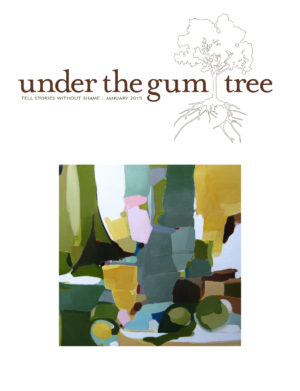Claudia Pierce

Claudia Pierce lives in San Francisco. Finding beauty and inspiration in nearly everything, she believes that all of life tells a story if one is willing to stop and listen. She is working on creating a workshop to help others find these stories within themselves, and bring them to light. In her spare time, she can be found exploring her city’s hilly terrain, painting or coloring, and convincing her two cats that a laptop is not their personal Barcalounger.
Claudia’s piece, “Fea,” is the transformative story of one young woman changing her self-image and her own perception of self, after years of being called what may have seemed like an innocent and affectionate enough nickname by her mother—Fea, or Ugly, in English. Her story reminds us that it’s truly never too late, or even too bleak, to turn your life into one you can be happy to live and to have. “Fea” is rich with intimate experience and life lessons, but if anything should be gleaned at all, it’s that life is beautiful, and for us to discover it, we must first be able to find the beauty within ourselves.
Your piece is an extraordinary one in terms of the emotional and psychological distress that an individual is able to endure for years and to overcome, but also in demonstrating just how powerful the use of words and labels can be. Do you mind telling us how you actually came to understand the transaction in the pizzeria between you and the young man who—in his mind—was only “paying you a compliment”?
It actually took me a long time to come to terms with what happened in the pizzeria that night. I think mostly, I was embarrassed, and didn’t like to think about the incident too much. It wasn’t until much later in life, when I finally started doing work to love myself that I looked back and realized “Oh, wow, he was really just expressing his kind thoughts, and I’m the one who assumed that he was mocking me, because I couldn’t accept that anyone could see me as anything but ugly.” It was a stark realization, but only came once I was ready to see things from a perspective other than the one I’d known my whole life. I suppose the Anais Nin quote is true: “We don’t see things as they are, we see them as we are.”
In reading your piece, readers may be struck by one of Dale Carnegie’s old principles: “Give a Dog a Good Name.” Ultimately the thinking behind this metaphor is that with whatever you have influence over, (Carnegie uses the dog example because of the dynamic of power between owner and pet), you need to encourage and uphold that person or thing to a fine reputation so that he/she or it may be able to live up to said reputation. You mention that in growing up and making it through high school you were shy, but how much, if any, of your shyness do you think spawned from your childhood nickname?
I would say a good deal of my shyness spawned from my childhood nickname. I think what I labeled “shyness” was really just a product of low self-esteem. I thought “well, why bother asking that boy out, or going to this dance, or asking someone to hang out, because I don’t deserve any of that.” I don’t lay blame on my mother or anyone for my shyness, or my actions growing up, but it would be silly to think this name (and others) didn’t contribute, at least in part, to my lack of self-worth.
In your piece there’s not a periphery of many characters, mainly your mother, you, and some supporting roles, so to speak. You mention a young nephew toward the end, but from the beginning of the narrative, readers are never overtly introduced to siblings. Were you the older of children or younger?
I have one older sibling, my sister. I am the youngest child in my immediate family, and until the next generation started (once I was already an adult), I was also the youngest person in my extended family.
Did your mother have any other characteristic nicknames for your siblings
My sister never received a nickname, nor did any other member of our family. My mother calling me this seems to have been random. Even when I’ve asked my mother what prompted her to start using the name, she hasn’t been able to explain it.
Interesting is your mother’s reasoning behind why she saw no fault or ill intention in calling you “Fea,” or rather, Ugly. This argument is an age-old one too, as such discussion over the Sapir-Whorf hypothesis demonstrates. Does language truly affect the perceptions of reality of we speakers and thus influence our thought patterns, or are words really just symbols, either on the page or spoken, that we then assign arbitrary meaning to? Obviously you found an ingenious way or explicating to your mother the former, that words really do bear weight and influence over us. How did the insight of handling that finally come to you?
Funny enough, it wasn’t something that required much thought. I honestly didn’t plot out a way to get back at her, or to make her understand. My solution was really a spur-of-the-moment thing that came about when she began the nickname with my nephew. I think it came full circle at that time, because to me he was the most beautiful thing I’d ever seen, and I realized that our words and thoughts can lie to us. I imagined this beautiful little person growing up thinking he was ugly for absolutely no reason, and I couldn’t bear that. I knew I had to step in, and the idea of giving her a taste of her own medicine came to me in the moment. I went with that route partially because it was something my young nephew could understand and follow, and also because, ironically, my mother is hyper-sensitive to how words are used toward her. She will dissect anything said to her, and try to find the criticism in it, so I figured it was best to serve her what she had been dishing out for so many years. Fortunately, it worked. I only wish I’d thought of it sooner, though again, I think it took witnessing the situation as an outside party to give me the clarity, motivation and courage.
What you went through, and what your self-esteem and perception sustained over the years really is grueling; to the extent that many of us will never be able to fully relate firsthand, even if we have undergone similar treatment in various other areas of our lives. How strongly do you hold what you learned from that experience and how much do you take-away, turning it into instruction on how to lead life?
It took me a long time to realize that my experience wasn’t “normal.” I’d been called ugly so much that in my head, I was just ugly. I speak to that in the piece some—to me, it was as plain as saying the sky is blue. So, in many ways, I didn’t realize it was a grueling journey, until I really set out to change my self-perception and start on the path of loving myself. Then, it became a fight; a fight between what I wanted to believe, and what I’d long accepted as fact. Now, I’m honestly grateful for the experience, because it has taught me a great deal. Mostly, it taught me not to believe everything you think. A perfect example of this is that for years I had a phobia of singing, because I believed fully that I was tone deaf. I loved to sing, but never would, because sadly (woe is me), I was horribly tone deaf. I told myself this for decades. Eventually, I decided to take a voice lesson to see if it could be remedied in any way, to make my voice at least somewhat bearable. I took that voice lesson, and I’m not tone deaf at all. I was just singing in the wrong key because I have a low speaking voice and assumed I had a low singing voice. Nope, I’m a total break-a-glass soprano, with a really good ear, and it turns out I love to sing. So, just because you hear something over and over again, or tell yourself something for years, doesn’t make it true at all. There is an old proverb that says, “Don’t listen to what they say, go see.” I hold this to heart. Don’t believe everything you think. Challenge your thoughts, especially the ones that limit you.
This experience has also taught me that words have an immense amount of power. I came from a family that threw abusive words around without thought, and without meaning, other than to express anger in the moment. They’d compliment you on your intelligence, but then call you stupid the moment you messed up on anything. I went out into the world throwing these words around with the same ease—ugly, stupid, worthless, etc, without even truly meaning them, or thinking about what I was really saying. It wasn’t until I threw one of these words at someone I cared greatly about, and they got very hurt, that I realized it was no different than being called ugly all my life. Energy follows thought, and thought is connected to our words. I now think carefully before I speak, and choose my words wisely so that I am communicating my true feelings, rather than using words glibly to momentarily express anger or frustration. The anger or frustration will pass, but the words you used will stick.
We can only thank you for writing and sharing such an intimate piece, Claudia. Is there anything else you you’d like to share with readers?
More than anything, I’d like to say that my mother is really a good person. I know I don’t paint her in the best light in this piece, and while all I’ve said of her is true, she is overall a kind-hearted and very generous person, and a very loving mother. I don’t know what possessed her to give me this nickname, and I don’t think she does either, but I don’t fault her for it. I shudder to think of the damage I’d have unknowingly inflicted upon my kids had I had them in my early twenties, as she did. At the end of it all, I can say without a doubt that my mother adores me, and would give her life for me, and that’s more than many people get, I think. For that, I’m grateful.

